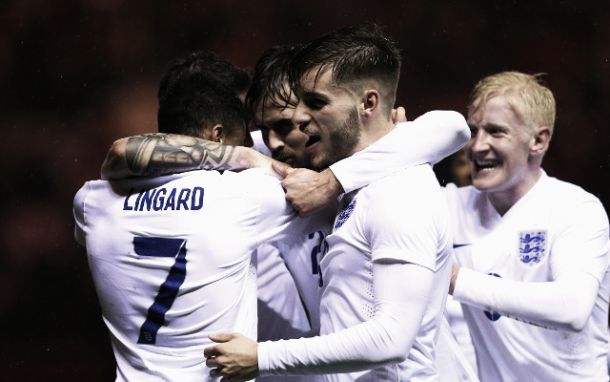On Monday night, a promising England U21 side twice came from behind to beat a Germany team made primarily from Bundesliga regulars and guarded by Barcelona Champions League goalkeeper Marc-André ter Stegen.
Cheered on by an almost-capacity crowd of 30,178 in Middlesbrough's Riverside Stadium, England's youngsters put in a considerably more spirited performance than many seen in the increasingly stale Wembley.
The impressive Jesse Lingard, winger Nathan Redmond and Southampton's James Ward Prowse scored to cancel out birthday boy Philipp Hofmann's excellently-taken brace, and there is no questioning that the crowd played their part.
The atmosphere in the opening stages was a reserved one as the Germans exercised considerable superiority over their travelling hosts, in a stadium which had not seen international action since Brazil put Great Britain to the sword in a pre-Olympics friendly three years ago.
However, the ironic cheers of England winning a corner thirty minutes in soon turned to genuine noise and passionate support as the plucky underdogs took a foothold in the game, and the roar which greeted Lingard's first-half equaliser was equal to any scored by Boro at home this season.
It could have been twice as loud if homegrown hero Ben Gibson had risen slightly higher to nod home Luke Garbutt's enticing free-kick earlier on, however. The sense of pride in both player and crowd was tangible, and Gibson spoke after the game of his teammates' enjoyment playing in an often-neglected part of the country.
One has to consider the effects playing elsewhere could have on Gibson's teammates. For Ward-Prowse to play at Southampton's St Mary's, for example, or man of the match contender John Stones to play in front of his home crowd at Everton for their country would surely be a special event, and one simple truth which can be taken from the U21s' exploits is that Teesside now likely feels a greater affinity to the youngsters than it does to the senior side.
U21 boss - and former Middlesbrough captain and manager - Gareth Southgate spoke enthusiastically about the Teesside crowd, while praising the club for setting ticket prices at just £10 for adults and £1 for concessions.
“In terms of the supporters it was a fantastic turnout and we really appreciated the support that they gave us,” said Southgate. “I think we sent them home with some good memories.
“It was especially nice to see some young fans. The club helped a lot with the price of tickets and to be able to take England on the road and show people some of the stars of tomorrow – which I’m sure some of our players are – was great.
“To get that turnout gave the players a huge lift and we’re grateful to everybody.”
It is not just the uninspiring tournament performances of the Three Lions which has left many feeling disenchanted with England. There are very few who have the time or money to spend on a trip to Wembley from elsewhere in the country, and the prize of a 4-0 stroll past Lithuania, a practice match against a set of San Marino training cones or a post-World Cup 1-0 against the world's 70th-best team Norway does not inspire.
England's first team has not played in Middlesbrough or Sunderland since 2003, or in Newcastle since 2005. With few Northern-based players making it into Roy Hodgson, Fabio Capello or even Steve McClaren's teams, there is little connection between the region and its national side, and for the team to tour the country would do much to change this.
As well as the fans, the opportunity to play in for England front of one's home supporters adds an extra dimension for the players. Since the dawn of time, our stars have struggled to reproduce their club form when clad in England white, and the suffocating pressure of playing at Wembley could be argued to play a part in this. Put Raheem Sterling in Anfield or Wayne Rooney in Old Trafford, and it is difficult to see them producing anything other than their best.
It has worked for other nations. Germany, Brazil, Italy and the Netherlands all play their home matches around their respective countries, and it would be fair to say all four of these examples have enjoyed greater success in the last ten years than England have in the last thirty. The reception received by Germany's World champions as they toured the country in a series of international friendlies showed a nation united as one, something which could rarely be said of England when talking about football.
However, the cost of Wembley and no doubt some talk of tradition means that, for the forseeable future, we are unlikely to see the Harry Kane fairytale taking England to White Hart Lane, or Fabian Delph's recent rise see the return of international football to the historic Villa Park.
But at very least, it would be something to consider. Who knows - maybe we could even beat the Germans again.









































